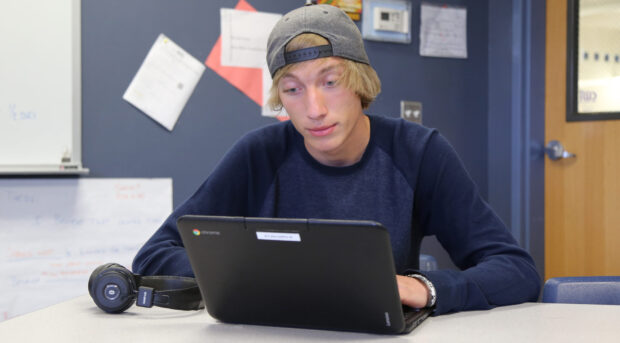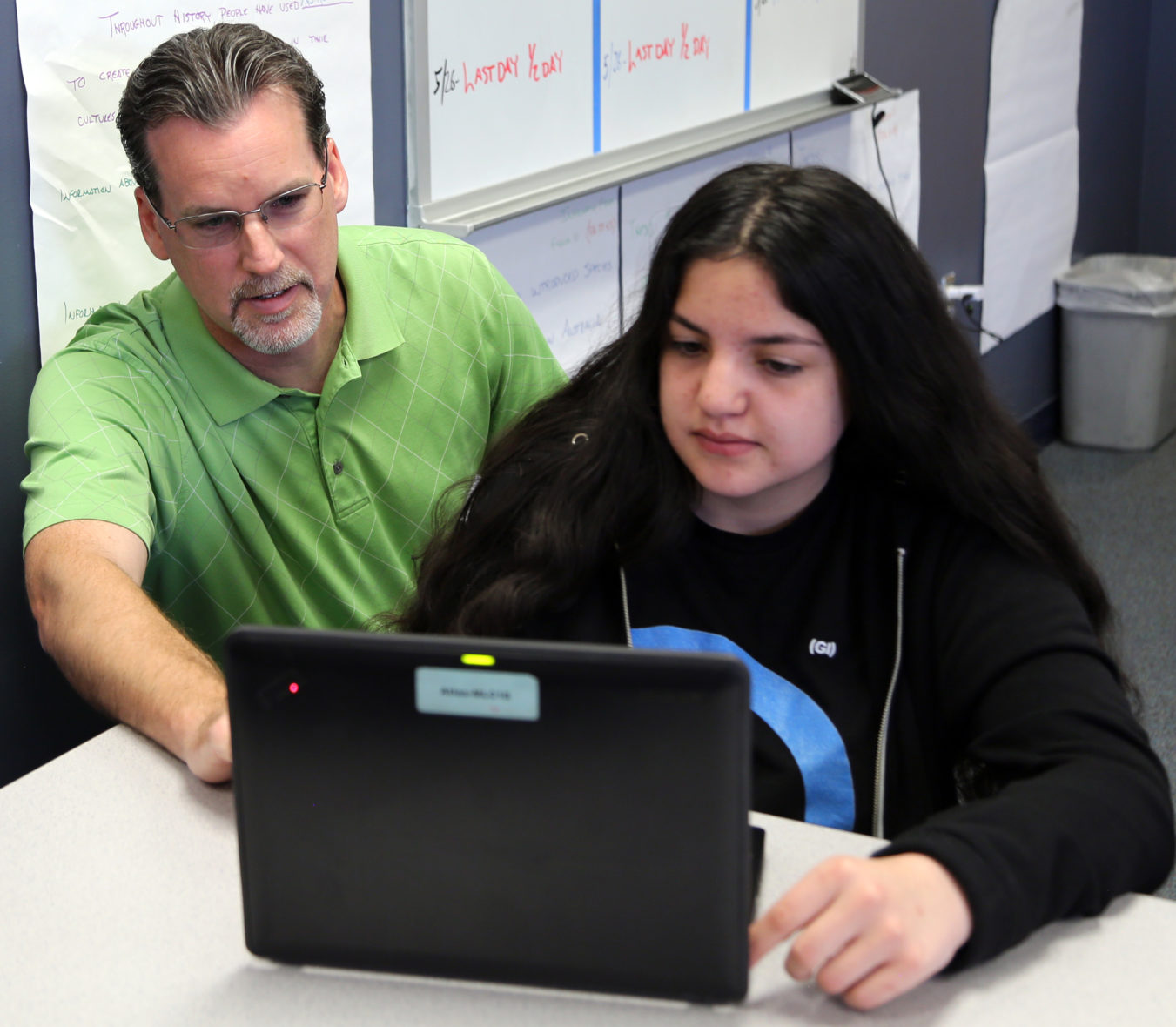MIDDLETON — Rachael Holman and Darius Paullus weren’t sure how to handle the switch to mastery-based education until they realized it was about the effort they put into their own education.

Their school, Atlas Academy Alternative School, just finished its first year under mastery after shifting to the competency-based education model.
Under mastery, students no longer advance between subjects and grade levels based on spending a year in class and avoiding a failing grade. Instead, they advance only when they master the subject material and academic standards.
At Atlas, that means breaking down each standard into “I can” statements (such as “I can identify the central theme of a text and I can cite evidence to support my interpretation.”) and requiring students to put in “A” or a “B” level work.
“C” and “D” work no longer cuts it.
Predictably, that means some students take longer than a year or a semester to master a course, while others master a class in a few weeks, earn the credit and move on to a more advanced class or grade level.
“I rewrote a lot of stuff, I had to re-do a lot of work,” said Darius, a high school junior by age but a senior based on credits earned. “It made me feel like I actually had to try. If I’m not displaying knowledge in the target areas, I’m not doing what I need to do.”

Rachael, a sophomore, agreed.
“It’s like jumping from goal to goal,” she said. “It’s like if you’re climbing a mountain and you want to know how to get from that tree to that rock.”
Middleton and other districts’ moves to mastery have added significance. In 2013, Gov. Butch Otter’s Task Force for Improving Education unanimously recommended Idaho schools transition to mastery — a huge shift that could affect school funding, bus and bell schedules, graduation rates and the time students physically spend at school.
Superintendent of Public Instruction Sherri Ybarra has also endorsed mastery, but has suggested the change would be generational.
****
When English teacher Wayne Ross heard about mastery, he decided to go all in. For him it represented a chance to teach English and literature in a manner that more closely resembled Advanced Placement classes.
The move allows Ross to insert more rigor into the classroom, while giving students a choice about their education.

“Under the old system, which unfortunately allowed ‘D-minus’ to count for credit, we didn’t see that as doing any kind of service,” Ross said. “’D-minus’ is a passing grade in school, but that’s not passing in society and we wanted to push the level higher.”
The choice comes in the form of flexibility, Ross said.
Students can advance at their own pace, which means they can spend as much or as little time on a unit or assignment as necessary.
And if students don’t master the content to earn credit by the end of the year or semester, they return at the beginning of the next semester or next year and pick up right where they left off. However, they won’t be forced to start over from scratch. That is to say, if a student mastered 80 percent of a class as the school year ends, the student would begin the next year working on the remaining 20 percent.
Principal Christie McMillen said mastery transforms students who buy in. Now, it’s no longer acceptable to do the minimum, skip the vast majority of tests or assignments and coast through with a “D.” It also means the days of students bringing home report cards littered with “Cs” and “D”s are over. Instead, students persist until they achieve “B” or “A” level work.
“We saw students (before) who failed a class six times and started back over six times, frequently in math,” McMillen said. “That’s six “F”s on a transcript.”
Under mastery, the transcript would simply show an incomplete until a student earned the credit.
That’s not to say change is easy.
A small number of students refused to go along with the change, either by dropping out, pursuing a GED or transferring, Ross said.
Some parents also expressed skepticism.
The change, at least initially, has also made it harder for students to earn credits.
Ross said last year students attempted 220 credits and earned 149 in the first semester. This year, students attempted 220 credits but earned just 94. In order to earn those 94 credits, students had to work harder, and Ross would no longer accept “C”- or “D”-level work.
That development could mean some students will take longer than four years to graduate. But Ross said some students graduated late anyway, after struggling in a more traditional high school, lagging behind on credits or struggling with attendance or discipline issues.
Others are likely to graduate early, and have the opportunity to pursue college credits or other advanced opportunities before they otherwise would.
But Ross and the staff won’t stop with mastery. Superintendent Josh Middleton, McMillen and Ross “closed” the Atlas School for good when the school year ended Friday. They will “open” the new Middleton Academy, home of the Wolf Pack, when the 2017-18 school year begins in August, after stripping away the Atlas name, logo and school colors. Based on student input, school officials wanted Middleton in the name and they wanted to create a new identity the community and its students can rally around.
By next year, Ross even expects to remove the bells that signal the beginning and end of classes.
“If I was back in high school, this is the way I would want to do it,” Ross said. “In the classes I struggled in, I would need more time. But the others? If I’ve showed I mastered it, why I do I need I need to still sit there over and over again?”
****
Rachael said the shift to mastery has forced her to end her procrastinating tendencies. It’s also convinced her to take ownership of her education and pay closer attention.
“You have to keep up. You can do the work at your own pace, but you have to make sure you do the work and put in the effort,” Rachael said. “It makes me feel better about myself, because if I went to regular high school, you do the test and if you get a ‘C’ or whatever, you’d be done. Now, you have to know what you’re learning to move on to the next subject.”
Initially, Darius considered the shift “a bit drastic.”
“It’s me sitting in class and not having a teacher tell me what to do or redirect my behavior at all. If I just sit here and put head down, it’s my choice,” Darius said. “But really it’s my job to push myself to get the competencies. It’s a change for yourself, I guess. It makes you reflect.”
Now he has focused, and Darius said he is back on track and working ahead.
“Mastery has allow me to be flexible with what I do,” Darius said. “I can focus on one class, and maybe I get it down in two weeks. Before, that would be a semester.”
“Coming into this year, I didn’t expect to excel as much as I did,” Darius continued. “Now that I’m doing so well this year, it’s kind of hit me. It was a wakeup call.”
After just one year into the transition, Rachael said her grades are up and she is thinking about her own future like never before.
“This school has actually inspired me to want to be a teacher after this,” Rachael said. “I want to make a difference and help students like me or Darius, or anybody else.”
